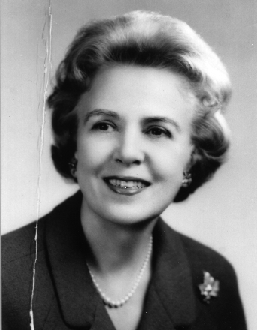Page 40
[Begin Tape 1, Side A]
Currie: I think last time we talked about some of your experiences at Electronics magazine. You also had some other assignments from McGraw-Hill during World War II. I wonder if we can pick up there.
Montgomery: I was getting along very well with my Electronics when a message came from New York, from the editor of Textile World that he wanted me to take over the Washington reporting for their magazine. This meant all of a sudden I would be Washington editor of a magazine for an industry about which I knew not very much, and it meant getting different contacts than I had with Electronics. I must say that my work in Electronics was not heavy at that time because so much on that subject was classified. So there was ample time to take on something, but this was a far cry from what I was doing. However, I made up my mind that there was no choice, and I'd go into it and make a success of it.
The logical thing was to get some outstanding person in the textile industry to give an exclusive interview, which I was able to do with Spencer Love, the acting director of the textile and clothing division of OPA. He was on leave as president of Burlington Mills, and he had given no special interviews. Furthermore, after my going for one interview, he agreed to write an article entitled "War Production: The 1944 Problem in Textiles." This was a real plus for me.
The articles forecast, for example, how much the mill owner could expect in government orders for textiles during the next quarter. Were they going to want more textiles? What particular ones was the government likely to want, and for how long? It couldn't be exact, but this was a much needed forecast of what the mill owners might expect. Therefore, it was with considerable interest that they read these articles, which were rather lengthy.
Currie: Were these articles to help them with war production?
Montgomery: The articles were meant to help them to be ready to fill government orders, or should they cut back on what they were producing, so that it gave them an idea, without being completely accurate, of what they could expect. Somehow or other, these turned out to be accurate. At least the evaluation of them, as expressed, would indicate that. Anyhow, it wasn't an easy job.
When the war was over, there was no need for any forecast article, so I had a very nice letter from my New York editor saying that it was with regret that they would have to do away with this, the reason being quite obvious, but he added, we couldn't have asked for a better Washington editor.
The thing that was coming to mind then for me was atomic energy, but I'll continue and say that about four years later, when there was mobilization going on for Korea and it was evident that we were going to get involved, the then editor of Textile World wrote to me to say that he very much hoped that I would take on again the type of forecast article that I wrote earlier.
However, by this time, I was already involved in something new: atomic energy. So I had to pass up this offer.

